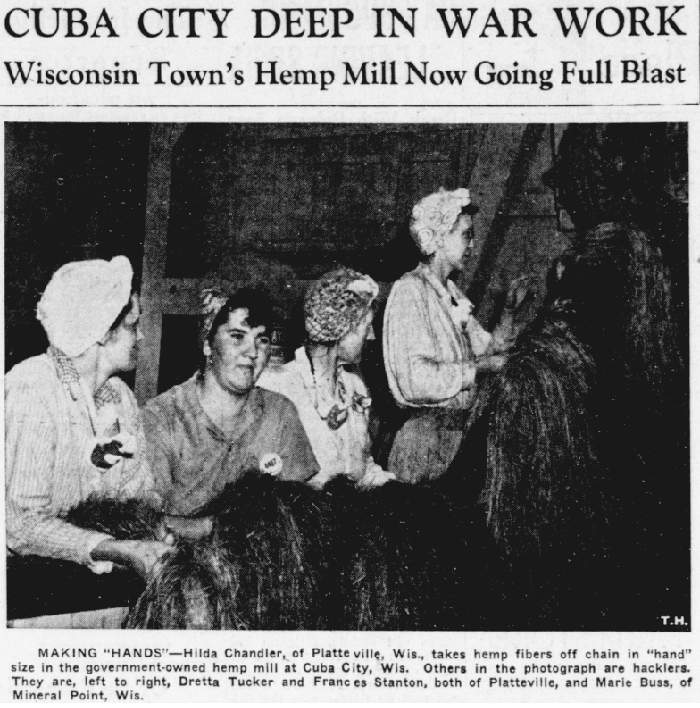
|
 |

|
|---|

Hemp Mill Workers during the War - Dubuque Telegraph Herald 1944-05-28p16
THE ECONOMIC IMPACT TO OKLAHOMA'S TAX REVENUES
OF LEGALIZING MARIJUANA IN OKLAHOMA
8.0 – INDUSTRIAL HEMP - THE RESIDUAL INDUSTRIES:
HEMP MILLS/HEMP PROCESSING PLANTS:
Along with Industrial Hemp, it can be expected that a host of other “residual” industries will also be coming to Oklahoma. As a good example, some of them will be small “agro-tourism” operations, while others may turn into major multi-million dollar corporations. Probably the best example of which will be the needed Hemp Processing mills.

[Government Owned (WW2) Hemp Mill]
When Industrial Hemp comes to Oklahoma, a secondary industry employing hundreds if not thousands of workers will also (by necessity) be created. Because the Hemp stalks of-and-by themselves are rather bulky and heavy, this creates a situation that then leads to high transportation costs, but a situation that can easily be remedied by milling and processing the stalks as close to the growing sources as possible. In so doing, ONLY the select fibers and hurd’s (depending upon use) are then shipped out to their individualized end destination points.
During the Second World War’s, “Hemp For Victory” program (discussed in another report) the federal government built from scratch 72 new Hemp Mills to service our war needs at the time. It had little trouble building them, and the equipment needed for Hemp breaking and combing the stalks was minimal. In fact the main problem that they had at the time (despite good wages) was finding laborers to work in the mills. So much so, that they were forced to recruit women, girls and even boys as young as 16 years old to work in them.
Given our state’s unemployment situation, one can presume that (given good wages) there will be no shortage of worker applicants. However, the number of these mini-Mills as well as their locations will depend upon the amount of local hemp acreage in production. Meaning that these mills will probably be built in rural not urban areas.
WARNING:
This Hemp Mills (just like those operating during the Second World War), should not be confused as being actual manufacturing plants. But instead solely as processing mills required to process the raw stalks, separating the useful components into separate bundles. Which in turn are then shipped out as raw materials to the various manufacturing plants throughout the country.
As for seed production, other than for washing (which requires no special equipment) and plastic bagging, no problems are foreseen with transportation expenses. However, as an aside, if Oklahoma was ready for yet another light industry (meaning yet more jobs), cold pressing Hemp seeds (which are between 20 to 40% oil), can provide our state with yet more jobs. And as Hemp seed oil, can and historically has been used in medicines, foods as well as a while variety of industrial uses, demand for hemp pressing plants will be there. --- The remainder or the none-oily part of the crushed seeds have historically been used as high protein poultry feed, but can be used for a whole host of things.
HOWEVER, from a tax review standpoint, the exact economic impact of such processing plants remains unknown. But it will be a positive factor in dealing with Oklahoma’s State review shortfalls. The only point being made here is that the two industries (by economic necessity) will invariably be linked together.
STATE REVENUE BENEFITS (new incoming tax revenues):
In terms of an actual dollar amount, for obvious reasons those figures are unknown and will remain so until well after re-legalization. But it will definitely be a big plus for the state.
ADDENDUM-D shows a governmental ad offering surplus Hemp mills for sale. The ad shows locations, numbers, and type of equipment found within these WW-2 mills.
|
AS AN ASIDE: As an additional bonus, if Oklahoma plays its cards right, it can also acquire quite a few additional manufacturing plants as well. Given the fact that Oklahoma is a low tax state, geographically speaking, in the very heart of the United States. AND the fact that so much fiber/cordage material will be grown locally (meaning low transportation costs), it seems reasonable to assume that some rug/cloth/tent/backpack mfg., would be tempted to set up shop here. |
WANT TO KNOW MORE:
=====================
Due to space / download time considerations, only selected materials are displayed. If you would like to obtain more information, feel free to contact the museum. All our material is available (at cost) on CD-Rom format.
CONTACT PAGE
 BUDGET REPORT PRIVIOUS SECTION |
 |
 BUDGET REPORT ADDENDUM A |
 BACK TO MAIN PAGE OKLAHOMA BUDGET REPORT |